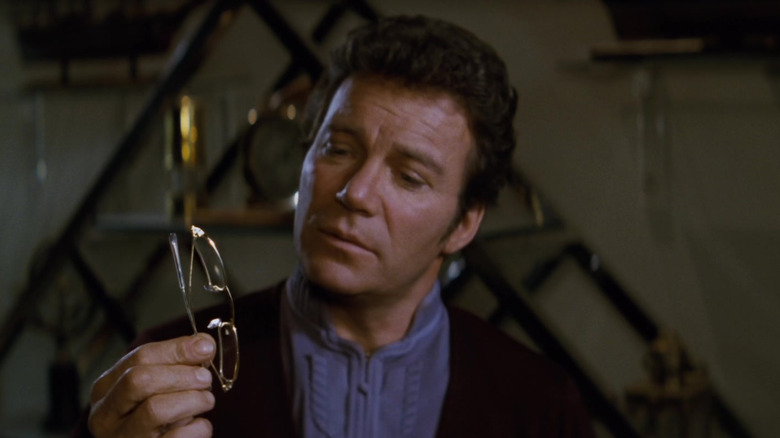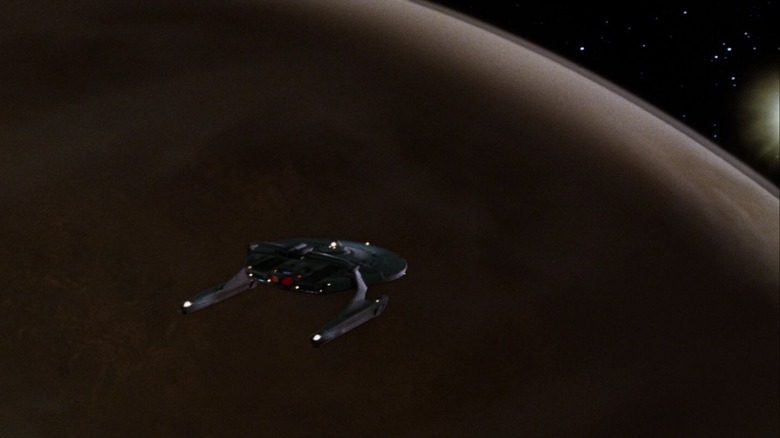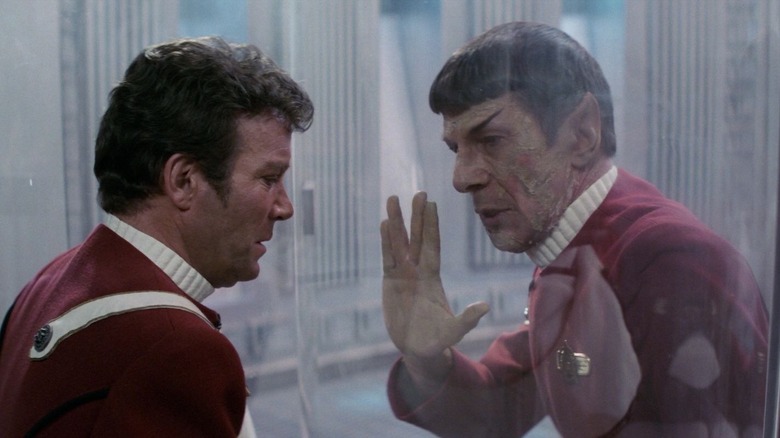How Gene Roddenberry Tried To Sabotage Star Trek II: The Wrath Of Khan
Nicholas Meyer's 1982 film "Star Trek II: The Wrath of Khan" is generally regarded as the best of the 13 extant "Star Trek" movies, at least according to any Trekkies you may ask. At the very least, "The Wrath of Khan" became the popular model on which multiple other "Star Trek" movies would be based; several "Star Trek" films feature a charismatic, revenge-bent "villain" character at its center.
At least one person, however, really hated "The Wrath of Khan" — "Star Trek" creator Gene Roddenberry.
Roddenberry had spent the bulk of the 1970s attending "Star Trek" conventions and refining his thoughts on his creation. He and Trekkies, during the conventions, began to zero in on the pacifist, diplomatic nature of the show, coming to the conclusion that "Star Trek" isn't about dominance or military power. Instead, it redefines power as being connected to intelligence, professionalism, and one's ability to solve problems in a group. Even if the problem is a vast, cosmic mystery that the human mind can barely comprehend, "Star Trek" announced that we'd face it with open hearts.
That was the premise of 1979's "Star Trek: The Motion Picture," anyway, a film Roddenberry produced and was closely involved with. He wanted a large-scale "Star Trek" story that drew more from "2001: A Space Odyssey" than from "Star Wars."
However, "Motion Picture" was only a modest hit in 1979, and Roddenberry, despite inventing the franchise, was pushed out of the production of "The Wrath of Khan." Harve Bennett and Meyer made their own "Star Trek" animal, opting for a "swashbuckling adventure" tale wholly different from the cosmic freakout of the first movie.
Roddenberry was understandably bitter. Indeed, according to a 2020 article in CinemaBlend, Roddenberry — motivated by spite — tried to sabotage "The Wrath of Khan" by leaking vital plot details.
The Wrath of Roddenberry
"Star Trek" historian and "Inglorious Treksperts" podcast host Mark A. Altman was able to speak at length with CinemaBlend about Roddenberry's bitterness, including his attempts to deliberately spoil the plot of "The Wrath of Khan." Recall that "The Wrath of Khan" ended with a bombshell. Spock (Leonard Nimoy) had to enter an irradiated section of the U.S.S. Enterprise's engine room to repair a vital system during a desperate mid-space battle. He was able to fix the engines and the Enterprise sailed to safety, but not before he received a lethal dose of radiation. The movie's final scenes involved loading Spock into a coffin and shooting him into space.
The fact that Spock died was, as one might imagine, a secret during the production of "The Wrath of Khan," although it wasn't so big a secret that Paramount was worried. The budget for the film was lower than "The Motion Picture," and there wasn't as much breathless hype surrounding it. Recall, also, that there wasn't yet a 24-hour news cycle, so reporters weren't sniffing around film sets as often hoping to break tiny details.
As such, when Roddenberry leaked that Spock might die, Paramount began to sweat for the first time. As Altman explained:
"The only other time [Paramount] really got worried was when Gene sorta leaked the fact that Spock was going to die. They were afraid then, 'Well if we lose the 'Star Trek' audience, then we have a problem.' You know, a lot of people were saying, 'If Spock dies, you die. If Spock isn't there, I'm not coming.' People forget, this was a very big deal, it was very vitriolic. Obviously, after the movie came out, people were very happy with the way things worked out."
Roddenberry's sabotage didn't work.
Roddenberry's attempt at sabotage didn't work
But, golly, he tried. One might posit that someone other than Roddenberry leaked the "Wrath of Khan" script to the public, and he was merely happy to see the film be potentially spoiled. However, Altman pointed out that the script in question was indeed Roddenberry's copy. Altman even put the kibosh on rumors that Roddenberry's secretary and longtime girlfriend Susan Sackett was the real cause of the leaks:
"Some claimed it was Susan Sackett who leaked it. It was Roddenberry who leaked it [...] this is because there was a code on each of the scripts that could be traced back to whoever it was. The script that was leaked had the Roddenberry code. Susan may have been the person who actually sent it for Roddenberry, because Susan was Gene's secretary, but it was unquestionably Gene Roddenberry who did it. It's just a fact."
When "Wrath of Khan" was finally release, Roddenberry admitted — begrudgingly — that he kind of liked it, although not for the reasons most Trekkies did. Roddenberry admitted that Ricardo Montalbán's return was the film's big saving grace, as the actor brought so much personality to Khan (a role he, of course, originated on "Star Trek: The Original Series"). Roddenberry hated a lot of the smaller details, though, and spoke out against the fact that Kirk killed a Ceti eel for no reason.
Eventually, as Paramount made several more sequels without Roddenberry, the show creator went back to TV with an idea for a new "Star Trek" show set about a century after the events of the first. By 1987, Roddenberry launched "Star Trek: The Next Generation," and history was made.


